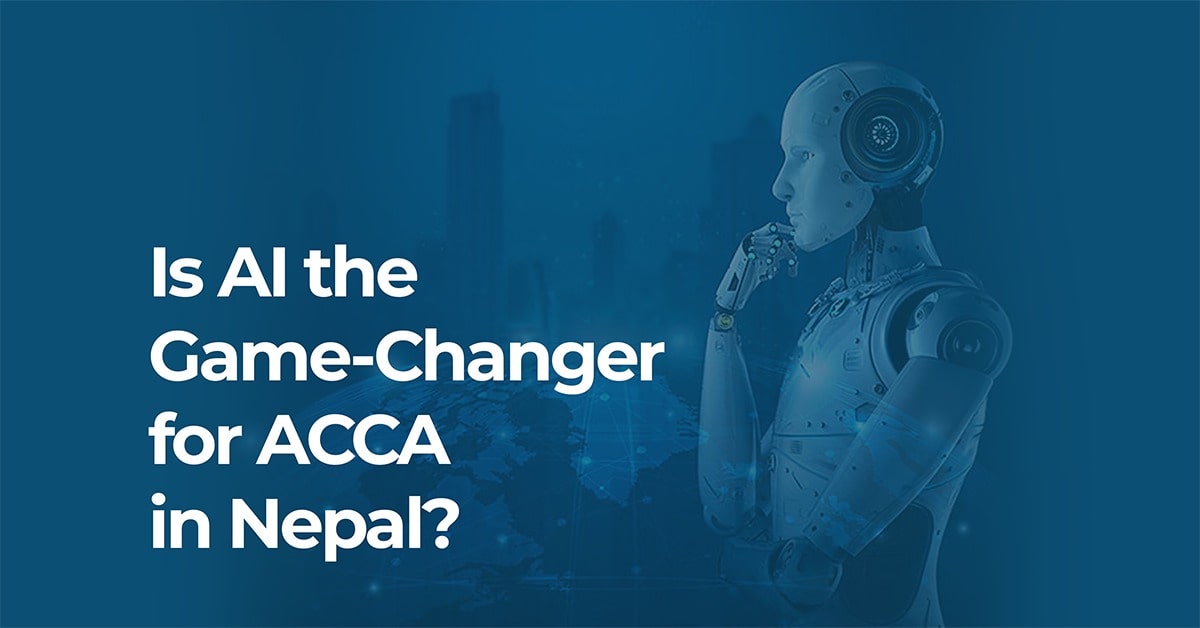Artificial Intelligence and Its Impact on ACCA Careers in Nepal’s Finance Industry
The accounting profession globally is undergoing rapid transformation driven by artificial intelligence and automation technologies. For ACCA professionals in Nepal, this technological evolution presents both challenges and opportunities that will reshape career trajectories in the coming years. Understanding these changes allows forward-thinking accountants to adapt their skills and position themselves advantageously in an evolving employment landscape.
AI Adoption in Nepal’s Financial Sector
Nepal’s financial industry has begun embracing artificial intelligence, though adoption remains uneven across different organisations. Banking institutions lead implementation efforts, with larger commercial banks deploying AI solutions for credit scoring, fraud detection, and customer service automation. Professional services firms, particularly those with international affiliations, have implemented AI-powered audit tools that automate document review and transaction testing.
Corporate finance departments show more varied adoption rates, with multinational corporations implementing financial process automation while smaller organizations maintain traditional approaches. Despite growing implementation, Nepal faces distinct challenges, including infrastructure limitations, data quality issues, and shortages of specialised technical talent. These constraints create a gradual transformation path, allowing professionals time to adapt alongside technological evolution.
Transformation of Traditional ACCA Roles
The ACCA scope in Nepal is evolving as artificial intelligence reshapes traditional accounting functions. Transaction processing roles face significant automation pressure, with AI systems increasingly handling routine bookkeeping, reconciliation, and reporting tasks. Audit functions are experiencing substantial methodology changes as automated testing tools examine complete transaction sets, shifting junior auditors’ roles from sample testing to exception investigation.
Management accounting has evolved through AI-powered forecasting and scenario modelling tools that generate sophisticated financial projections with minimal human intervention. Tax compliance activities increasingly utilise rule-based automation systems that apply complex regulatory requirements to economic data, generating returns and identifying optimisation opportunities.
Emerging Opportunities in the AI Landscape
While certain traditional functions face disruption, the technological transformation creates valuable new opportunities for adaptable ACCA professionals. Data quality governance has emerged as a critical function as organisations recognise that AI systems require reliable financial information to generate trustworthy outputs. AI implementation and oversight positions represent another growth area, requiring professionals who understand financial processes and AI capabilities.
Ethics and algorithmic governance functions address growing concerns about AI decision-making transparency and potential biases. Advanced advisory services leveraging AI-generated insights represent perhaps the most promising opportunity, as value shifts toward interpretation, context provision, and strategic recommendation areas where professional judgment and business understanding remain distinctly human advantages.
ACCA Jobs in Nepal: Disruption vs. Growth
Roles experiencing significant disruption include accounts payable/receivable processing, basic financial reporting focused on data compilation, routine audit testing, standard tax return preparation, and manual financial analysis positions following predetermined frameworks.
Conversely, roles showing growth potential include financial data scientists combining accounting expertise with analytical capabilities, technology integration specialists bridging financial functions and IT systems, financial controls experts ensuring AI systems maintain regulatory compliance, business partnering roles providing strategic insights, and transformation consultants helping organisations redesign financial processes around AI capabilities.
This bifurcation creates a “barbell effect” in the employment market, with opportunities expanding at both the technological implementation and strategic advisory ends while contracting in routine processing functions.
Essential Skills for the AI Era
To remain relevant, ACCA professionals in Nepal must develop complementary capabilities beyond traditional accounting expertise:
- Data literacy has become foundational, requiring understanding data structures, quality dimensions, and analytical approaches. This doesn’t mean becoming a programmer, but comprehending how data flows through systems and impacts financial outputs.
- Technology interaction skills enable professionals to effectively utilise AI-powered tools and interpret their results appropriately, including understanding a tool’s capabilities and limitations.
- Critical thinking and professional skepticism become increasingly valuable as routine analysis is automated. The ability to question system outputs, identify potential errors or biases, and apply professional judgment differentiates high-value professionals from those easily replaced by technology.
- Communication and influence skills gain importance as accountants increasingly focus on advisory functions requiring recommendation articulation and stakeholder persuasion.
Practical Adaptation Strategies
For established ACCA professionals in Nepal, several practical approaches support successful adaptation to AI-transformed environments:
- Conduct a personal skill audit to identify areas requiring development to remain valuable as automatable tasks diminish in importance.
- Seek cross-functional exposure to technology initiatives by volunteering for AI implementation projects or process redesign efforts to build relevant experience.
- Develop specialised knowledge in growing niches like data governance, algorithmic ethics, or financial technology integration to differentiate yourself in increasingly competitive employment markets.
- Adopt a continuous learning mindset to support long-term adaptability as the technological landscape evolves rapidly.
Human Value in an Automated Environment
Despite technological advancement, several distinctly human capabilities remain valuable and difficult to automate:
- Ethical judgment, applying principles to ambiguous situations, requires human discernment despite rule-based ethics algorithms.
- Contextual understanding, connecting financial information to broader business circumstances, similarly requires human judgment developed through experience and business acumen.
- Relationship management with clients, colleagues, and stakeholders remains fundamentally human despite communication automation tools.
- Innovation and creative problem solving showcase uniquely human cognitive flexibility that AI cannot yet replicate.
Conclusion: Positioning for Future Success
The ACCA scope in Nepal continues to evolve as technology transforms the accounting profession. The most successful professionals will likely become technology translators, understanding accounting principles and technological possibilities. They will help organisations implement effective solutions while ensuring proper governance.
Rather than fearing technological disruption, forward-thinking ACCA professionals should recognise that AI removes routine burdens while creating opportunities for more meaningful, judgment-based contributions. By embracing this evolution and developing appropriate skills, Nepal’s accounting professionals can thrive in an increasingly automated future, focusing their talents on complex challenges and strategic insights where human expertise remains irreplaceable.








